Fiat 500 vs Suzuki Ignis - Differences and prices compared
Compare performance (118 HP vs 83 HP), boot space and price (17100 £ vs 15600 £ ) at a glance. Find out which car is the better choice for you – Fiat 500 or Suzuki Ignis?
Costs and Efficiency:
Looking at overall running costs, both models reveal some interesting differences in everyday economy.
Suzuki Ignis has a barely noticeable advantage in terms of price – it starts at 15600 £ , while the Fiat 500 costs 17100 £ . That’s a price difference of around 1526 £.
Fuel consumption also shows a difference: Suzuki Ignis manages with 4.90 L and is therefore barely noticeable more efficient than the Fiat 500 with 5.20 L. The difference is about 0.30 L per 100 km.
Engine and Performance:
Under the bonnet, it becomes clear which model is tuned for sportiness and which one takes the lead when you hit the accelerator.
When it comes to engine power, the Fiat 500 has a distinct edge – offering 118 HP compared to 83 HP. That’s roughly 35 HP more horsepower.
In acceleration from 0 to 100 km/h, the Fiat 500 is significantly quicker – completing the sprint in 9 s, while the Suzuki Ignis takes 12.70 s. That’s about 3.70 s faster.
In terms of top speed, the Suzuki Ignis performs minimal better – reaching 165 km/h, while the Fiat 500 tops out at 155 km/h. The difference is around 10 km/h.
There’s also a difference in torque: Fiat 500 pulls convincingly stronger with 220 Nm compared to 107 Nm. That’s about 113 Nm difference.
Space and Everyday Use:
Whether family car or daily driver – which one offers more room, flexibility and comfort?
Seats: Suzuki Ignis offers to a small extent more seating capacity – 5 vs 4.
In curb weight, Suzuki Ignis is distinct lighter – 935 kg compared to 1130 kg. The difference is around 195 kg.
In terms of boot space, the Suzuki Ignis offers distinct more room – 267 L compared to 185 L. That’s a difference of about 82 L.
In maximum load capacity, the Suzuki Ignis performs convincingly better – up to 1100 L, which is about 550 L more than the Fiat 500.
When it comes to payload, Suzuki Ignis to a small extent takes the win – 395 kg compared to 325 kg. That’s a difference of about 70 kg.
Who wins the race in the data check?
The Fiat 500 holds a solid overall lead in the objective data comparison.
This result only shows which model scores more points on paper – not which of the two cars feels right for you.
Costs and Consumption
View detailed analysis
Engine and Performance
View detailed analysis
Dimensions and Body
View detailed analysis
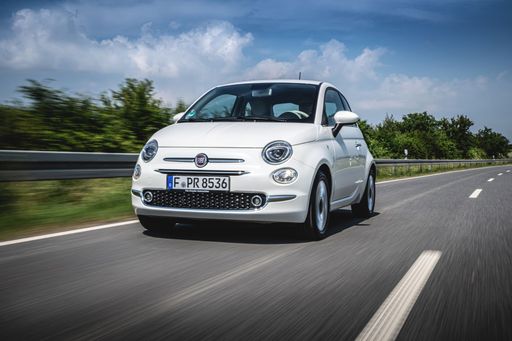
Fiat 500
Fiat 500
The Fiat 500 is a cheeky, retro‑styled city car that turns heads with its iconic looks and playful personality. Perfect for weaving through tight streets and easing into tiny parking spots, it’s aimed at buyers who want style and character more than grand touring prowess.
details
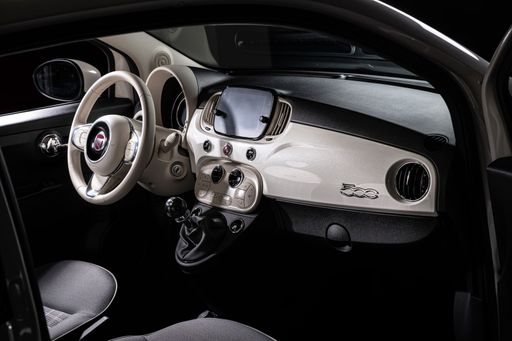
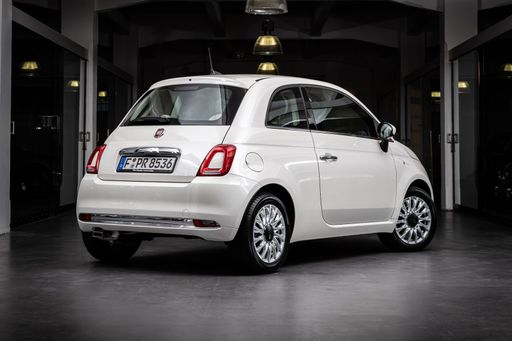
Suzuki Ignis
The Suzuki Ignis is a cheeky compact crossover that turns city chores into cheerful adventures, with chunky styling and a surprisingly practical cabin. It won't pretend to be a sports car, but its nimble manners, low running costs and ample personality make it an ideal pick for urban buyers who want fun without pretension.
details

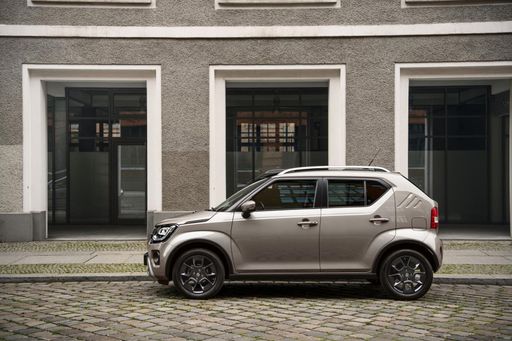
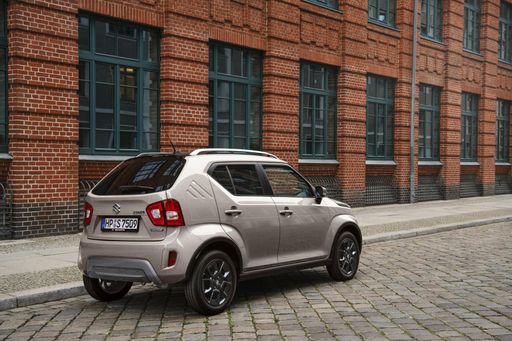
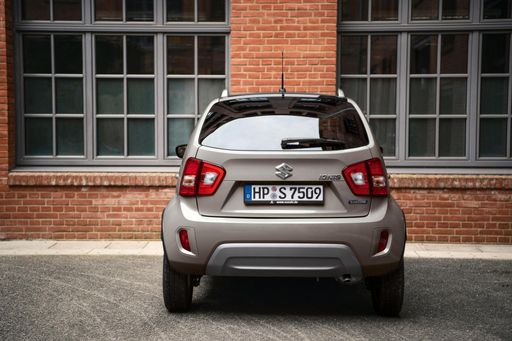
Costs and Consumption |
|
|---|---|
|
Price
17100 - 30800 £
|
Price
15600 - 19500 £
|
|
Consumption L/100km
5.2 - 5.3 L
|
Consumption L/100km
4.9 - 5.4 L
|
|
Consumption kWh/100km
13 - 14.7 kWh
|
Consumption kWh/100km
-
|
|
Electric Range
190 - 331 km
|
Electric Range
-
|
|
Battery Capacity
21.3 - 37.3 kWh
|
Battery Capacity
-
|
|
co2
0 - 121 g/km
|
co2
110 - 122 g/km
|
|
Fuel tank capacity
-
|
Fuel tank capacity
30 - 32 L
|
Dimensions and Body |
|
|---|---|
|
Body Type
Hatchback
|
Body Type
SUV
|
|
Seats
4
|
Seats
4 - 5
|
|
Doors
3 - 4
|
Doors
5
|
|
Curb weight
1130 - 1475 kg
|
Curb weight
935 - 995 kg
|
|
Trunk capacity
183 - 185 L
|
Trunk capacity
204 - 267 L
|
|
Length
3631 - 3632 mm
|
Length
3700 mm
|
|
Width
1683 - 1684 mm
|
Width
1690 mm
|
|
Height
1527 - 1532 mm
|
Height
1605 mm
|
|
Max trunk capacity
440 - 550 L
|
Max trunk capacity
1086 - 1100 L
|
|
Payload
250 - 325 kg
|
Payload
335 - 395 kg
|
Engine and Performance |
|
|---|---|
|
Engine Type
Electric, Petrol MHEV
|
Engine Type
Petrol MHEV
|
|
Transmission
Automatic, Manuel
|
Transmission
Manuel, Automatic
|
|
Transmission Detail
Reduction Gearbox, Manual Gearbox
|
Transmission Detail
Manual Gearbox, CVT
|
|
Drive Type
Front-Wheel Drive
|
Drive Type
Front-Wheel Drive, All-Wheel Drive
|
|
Power HP
65 - 118 HP
|
Power HP
83 HP
|
|
Acceleration 0-100km/h
9 - 16.2 s
|
Acceleration 0-100km/h
12.7 - 12.8 s
|
|
Max Speed
135 - 155 km/h
|
Max Speed
155 - 165 km/h
|
|
Torque
92 - 220 Nm
|
Torque
107 Nm
|
|
Number of Cylinders
3
|
Number of Cylinders
4
|
|
Power kW
48 - 87 kW
|
Power kW
61 kW
|
|
Engine capacity
999 cm3
|
Engine capacity
1197 cm3
|
General |
|
|---|---|
|
Model Year
2023 - 2025
|
Model Year
2020
|
|
CO2 Efficiency Class
A, D
|
CO2 Efficiency Class
C, D
|
|
Brand
Fiat
|
Brand
Suzuki
|
What drivetrain options does the Fiat 500 have?
The Fiat 500 is offered with Front-Wheel Drive.




